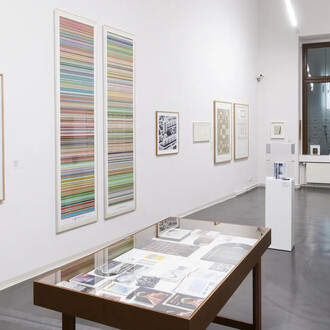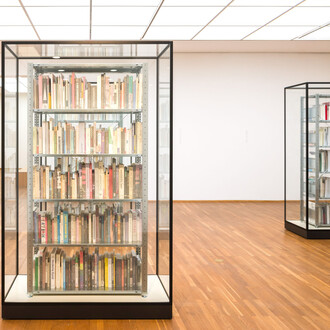As part of the exhibition series Reconsidering photography at the Museum für Kunst und Gewerbe Hamburg (MK&G), two generations with migration experience in Germany come together: Kurdish artist Pınar Öğrenci was invited to engage with the protest images of German-Turkish amateur photographer Nuri Musluoğlu. In her multimedia installation including materials from Nuri Musluoğlu's photography, video and sound archive, developed especially for the museum, Pınar Öğrenci reflects on the West German labour movement of the 1970s and 80s and on what a migration society means for Germany today. In addition, selected photo spreads and articles from the political journal Arbeiterfotografie, founded in Hamburg in 1973, introduce the historical background for the exhibition and provide insights into a life in exile, living and working conditions, women's work, the peace movement and unequal educational opportunities for migrants in the 1980s.
Migration and its representation are at the centre of the artistic practice of Pınar Öğrenci (b. 1973 in Van, Turkey, lives in Berlin). She often works with archival materials and personal biographies, taking a multimedia approach to historical and contemporary materials in order to critically examine the circumstances behind and decisions made on migration policy. Pınar Öğrenci’s site-specific installation is based on documentary footage tracing German-Turkish-Kurdish community life and a number of demonstrations that Nuri Musluoğlu recorded from 1975 to 1988. The images show protest actions, strikes and peace marches, summer festivals, performances by musicians in exile, sport clubs, weddings, and other celebrations as well as life of Musluoğlu’s family and friends. Öğrenci reinterprets protest culture from Turkey by using Musluoğlu’s photos and Super 8 films and puts them in the context of practices of resistance and solidarity.
Pınar Öğrenci studied architecture and conservation at Yıldız Technical University in Istanbul and emigrated to Germany in 2018. She had her first solo show at Kunsthaus Wien (2017) and exhibited her work at venues such as documenta fifteen (2022), Berlinische Galerie (2023), the Venice Biennale (2024) and Frac Bretagne (2024). In 2023 she was awarded the Villa Romana Prize, Florence. Öğrenci was nominated for the Böttcherstrasse Prize in 2022.
Nuri Musluoğlu (b. 1951 in Istanbul, Turkey, lives in Heilbronn and Bodrum) followed his parents to Germany in 1965 and completed an apprenticeship as a toolmaker. Among others, he worked in parallel for the IG Metall and Verdi Trade Union and later as a social worker for the Workers’ Welfare Association. Committed to serving as a mouthpiece for people with a migration background, he co-founded a German Turkish cultural centre in Heilbronn and was involved in the peace movement. Musluoğlu documented German-Turkish coexistence, xenophobia in public spaces and the conditions in asylum centres by photographing, filming and audio recording over 100 demonstrations in which he himself took part.
Since 1985, Musluoğlu has published his images under various pseudonyms in the left-wing weekly newspaper for workers and political asylum seekers called Türkiye Postası, which is published in Germany.
The exhibition series Reconsidering photography takes a critical look at themes, positions and gaps in the MK&G’s Photography and New Media Collection through the lens of contemporary artistic interventions. As part of the exhibition project and based on the theme of “guest workers”, photographs by Muhlis Kenter, Nuri Musluoğlu and Mehmet Ünal will be included in the collection. From 27 April to 5 October 2025, the new acquisitions by photographers of migrant origin will be presented at the MK&G. In the long term, the museum is working on diversifying the collection.
















